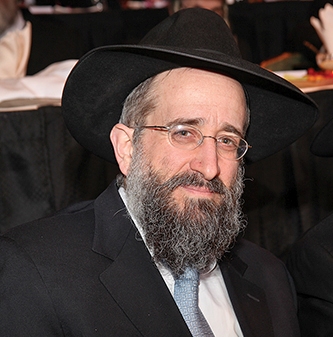Rabbi Reisman: Most Great Rabbis Were Completely Opposed to Political Zionism, Because of the Three Oaths
The following article is taken from the front page of the Flatbush Jewish Journal, Dec. 27, 2012.
Hundreds of men and women packed the Agudath Israel of Madison in the Flatbush neighborhood of Brooklyn, New York on Tuesday, December 25, to take part in a special morning-long series of lectures organized for the legal holiday, when many people are off from work.
Rabbi Yisroel Reisman, spiritual leader of the host synagogue, focused his lecture on the verse in Song of Songs 2:7, where King Solomon wrote: "Daughters of Jerusalem, I (G-d) make you take an oath...not to reawaken the love [for the Holy Land] until the time is right!"
Noting that the verse is repeated a second time in the Song of Songs, Rabbi Reisman said the great debate on the political aspects of Zionism that raged more than a century ago between the religious and secular segments of the Jewish people revolved around the above verse.
It would appear that the verse is commanding the Jewish nation not to force the issue of returning and gaining control of the Holy Land, our ancient homeland, until G-d deems it proper by sending us the messiah and our long-awaited redemption.
Indeed, Rabbi Reisman explained that the position of most of the greatest rabbis prior to the declaration of the State of Israel in 1948 was that of complete opposition to political Zionism. Furthermore, most of the Jews who did immigrate to the Holy Land did so not based on Zionistic sentiments, but as a reaction against strong outbreaks of anti-Semitism.
The First Aliyah (wave of massive Jewish immigration) occurred beginning in the early 1880s in response to the first violent anti-Semitic pogroms in Tsarist Russia that struck hundreds of Jewish communities, both large and small. The Second Aliyah beginning in 1904 was likewise the response of Jews to a second more deadly series of pogroms, especially in Kishinev. The Third Aliyah occurred during the years between World War One and World War Two when many Jews found the situation in Europe extremely unsettling.
Rabbi Reisman called the Third Aliyah the Grabski Aliyah in reference to the post World War One finance minister of Poland who made terrible decrees against the Jews, making it almost impossible for them to make a decent livelihood and pushing many Jews in desperation to immigrate to the Holy Land.
And the Fourth Aliyah was that after World War Two when survivors of the Holocaust made their way to new lives in the Holy Land.
According to the opinion of Rabbi Zeira in the Talmud, which is accepted as practical law, the verse in the Song of Songs only applies to a large number of Jews trying to go back to the Land of Israel by force. The Avnei Nezer also considered this verse as meaning that Jews should not go back to take control of the Land of Israel. An individual Jew, however, is permitted to go peacefully and live in the Holy Land, and even a large number of Jews may go if the government grants them permission to do so.
Although most of the Torah rabbis opposed the establishment of a Jewish state in our ancient homeland, once it was established in 1948, the attitude of some leading rabbis changed to one of working with the government in recognition of the fact that it does allow yeshivas to exist and grants freedom of religion for Jews to study and observe the Torah. As Rabbi Reuven Grozovsky wrote, the ideals don't change. The ideal of sticking to the three oaths remains. But because the facts on the ground have changed, therefore our behavior is different.
On the other hand, the Satmar Rebbe held that for a religious Jew to live today in those parts of Eretz Yisroel that are under the control of the Zionists is almost like living under the control and influence of idol worshippers. This was based on a verse in the Bible (I Samuel 26:19) in which King David expresses his disappointment in being chased into Gath in the land of the Philistines. King David felt that he was going to a land of idol worship, since he had to serve the Philistines, who in turn worshipped idols - despite the fact that the Philistines' land was part of the Holy Land.
The Flatbush Jewish Journal is delivered free of charge to 22,000 homes, synagogues and stores in Flatbush, Boro Park and the Five Towns. It reaches approximately 200,000 people.
